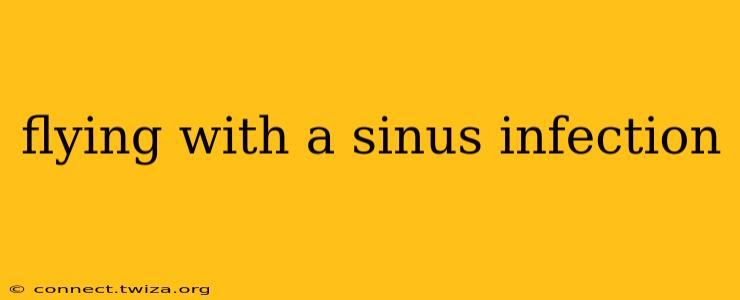Flying with a sinus infection can be incredibly uncomfortable, even painful. The changes in air pressure during takeoff and landing can exacerbate symptoms, leading to intense ear and sinus pain. This comprehensive guide will address your concerns and provide valuable information to help you make informed decisions about air travel when dealing with a sinus infection.
Is it Safe to Fly with a Sinus Infection?
This is a crucial question, and the answer isn't a simple yes or no. While it's not inherently unsafe to fly with a mild sinus infection, the experience can be significantly unpleasant. The pressurized cabin air can make existing congestion and pain much worse. If your infection is severe, involves a fever, or you're experiencing significant pain or discomfort, delaying your flight is strongly recommended. Consider consulting your doctor before making any travel plans.
What Happens to Your Sinuses During a Flight?
Air pressure changes during air travel are the main culprits behind sinus pain. As the plane ascends, the cabin pressure decreases, creating a pressure difference between the air inside your sinuses and the surrounding air. This pressure difference can cause sinus cavities to swell, leading to pain and discomfort. The opposite happens during descent; the increasing pressure can further aggravate the situation.
How Can I Make Flying with a Sinus Infection More Comfortable?
Even with a mild sinus infection, flying can be uncomfortable. Here's how to mitigate the effects:
-
Decongestants: Over-the-counter decongestants, both nasal sprays and oral medications, can help alleviate some symptoms before and during your flight. However, be aware that some nasal sprays should only be used for a limited time to avoid rebound congestion. Follow the instructions carefully.
-
Hydration: Staying well-hydrated is vital. Drink plenty of water before, during, and after your flight to thin mucus and ease congestion. Avoid alcohol and caffeine, as these can dehydrate you.
-
Chewing Gum or Sucking Candy: This can help equalize pressure in your ears and sinuses. The act of swallowing helps open the Eustachian tubes, which connect your ears and sinuses to the back of your throat.
-
Nasal Saline Spray: Using a saline nasal spray can help rinse and moisturize your nasal passages, providing some relief from dryness and congestion.
-
Medication Timing: Consult your doctor or pharmacist about the best time to take your medication to maximize its effect during the flight.
Can I Fly with a Severe Sinus Infection?
Flying with a severe sinus infection is generally not advisable. The pressure changes can significantly worsen your symptoms, potentially leading to more severe pain and even complications. A severe infection might also involve a fever or other symptoms that make travel unsafe. In these cases, postponing your flight until you're feeling better is the best course of action.
What Are the Risks of Flying with a Sinus Infection?
The primary risk is increased pain and discomfort during the flight. However, in rare cases, a severe sinus infection could lead to more serious complications if the pressure changes exacerbate the infection. This is less likely with a mild infection, but it's always best to err on the side of caution.
How Long Should I Wait to Fly After a Sinus Infection?
There's no single answer to this, as recovery times vary. Wait until your symptoms significantly improve – including reduced pain, congestion, and no fever. It's best to consult your doctor to determine when it's safe to fly after your recovery.
When Should I See a Doctor Before Flying?
If you have a severe sinus infection with symptoms like high fever, intense pain, or significant nasal discharge, consult your doctor before considering air travel. They can assess your condition and advise you on the best course of action.
By following these tips and prioritizing your health, you can make your travel experience more comfortable even with a mild sinus infection. Remember, consulting your physician is crucial, especially if your symptoms are severe. Prioritizing your health and well-being is paramount.
